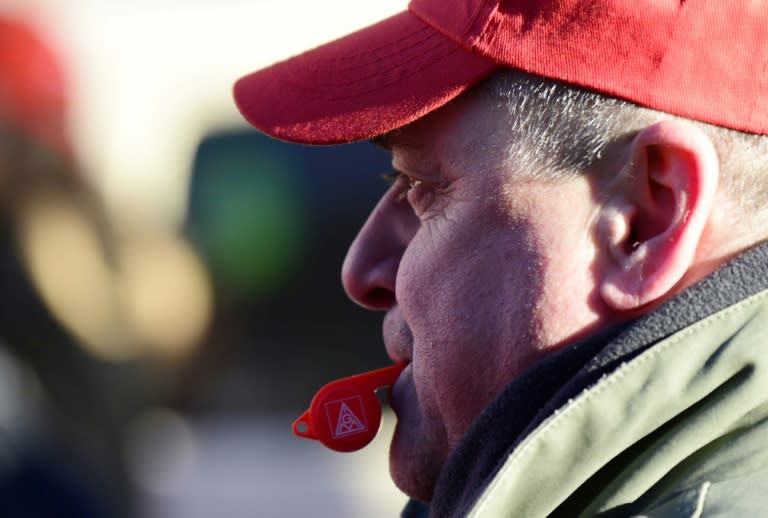German metalworkers start strikes for 28-hour week
Germany's powerful metalworkers' union launched mass strikes Monday over pay and working hours that could impact a key industry and the shape of labour nationwide. IG Metall are not just asking for a pay rise but also demanding that all workers have the option to temporarily switch to a 28-hour week in the pursuit of better work-life balance. Even more controversially, it wants shift workers and those caring for children or elderly relatives to be compensated for some of the salary loss that would come with clocking up fewer hours. Employers say such a drastic change would be illegal and have threatened to go to court to stop the industrial action. Some 15,000 workers downed tools across the country Monday, at 80 firms including car industry titan Volkswagen and its subsidiary Porsche, train manufacturer Bombardier and elevator maker Otis. IG Metall also announced the names of 143 firms targeted for strikes Tuesday. Up to 700,000 are expected to join a week of so-called "warning strikes", a familiar feature of the annual collective bargaining process that sees workers downing tools for a few hours to demonstrate at factory gates and in town squares. Strikes will stretch from Germany's "rust belt" in western North Rhine-Westphalia state to Brandenburg, Saxony and Berlin in the former communist east and the hyper-modern car factories of southwestern Baden-Wuerttemberg. If the two sides cannot agree on the negotiating terms negotiation at talks beginning January 18, the stage could be set for longer, more damaging walkouts. IG Metall has not organised a nationwide, open-ended strike in Germany since 2003. - Trailblazers - Boasting some 2.3 million members, IG Metall is Europe's largest trade union, representing workers of all kinds in industrial conglomerates like Siemens or Thyssenkrupp, steelmaking, the auto industry, electronics and textiles. The sheer weight of the metal and electrical industries' 3.9 million workers often draws other sectors along in its wake when it comes to pay deals -- and 2018's showdown could make for massive changes. Unions are demanding a pay rise of 6 percent this year. While the figure is triple bosses' initial offer of 2 percent, it is a classic starting position to wring out a compromise. Far more contentious is their other headline demand -- the right for workers to switch from 35 to 28 hours per week for up to two years, with the employer guaranteeing the right to return to full-time work -- as well as paying some of the salary shortfall in certain cases. IG Metall says the proposal would give workers a better quality of life. "Workers aren't only workers, they have personal lives, children, old parents, all that must be taken into account. Working life can't only be about sacrifice," Berlin IG Metall chief Olivier Hoebel told hundreds of strikers demonstrating in the capital with bibs in the union's signature red colour and whistles in hand. Employers fear up to two-thirds of workers could be eligible, leaving factory floors bare and prompting a new administrative tangle. And they argue that the change would be unfair to those who have already taken a pay cut when switching to part-time. The Gesamtmetall employers' federation has blasted the demands and any industrial action workers take to achieve them as outright "illegal", threatening to take the question to court. - While the sun shines - Industry leaders in metal and electricals -- key sectors for Germany that are in otherwise rude health -- are keen to avoid a drawn-out industrial dispute. "In general, strikes are not an appropriate means to resolve salary disputes. They hurt exports, and thereby the company and in the end the employees," said Bertram Brossardt, head of the employers' association for the sector in southern state Bavaria. With the German economy pumped up by strong exports and domestic demand, a labour market swept clean of skilled workers and low inflation, most of the cards appear to be in IG Metall's hand going into the talks. "We need a clear signal from bosses that they're interested in a solution for the question of working hours," IG Metall chief for southwestern Germany Roman Zitzelsberger said Sunday. Otherwise, "it will be extremely difficult to get through the talks with just warning strikes," he cautioned.




